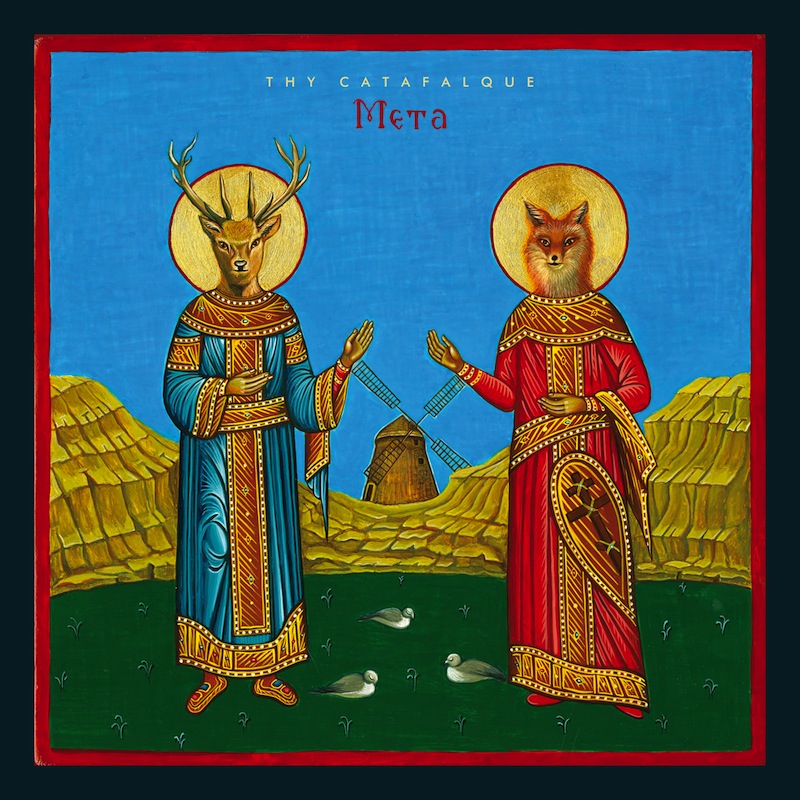Kayo Dot : Moss Grew on the Swords and Plowshares Alike

Once, years ago, there was a magical band called maudlin of the Well. While today they are no more, around the early 2000s they were a mystical and rarefied thing, a seeming vision of the future of both progressive music and heavy metal. They made, for lack of a better word, dream music. The group attributed in interviews, whether truthfully or facetiously, their compositional style to guided lucid dreaming, plucking melodies and harmonies from the indescribable aether of the Jungian/Freudian psychological mass of living dream. Whether this was truthful or not, one could still hear it in the music; songs shifted sideways, melted like psychedelics tear down the walls of the mind, leave burning doorways of smoldering color where once there was only a wall. They felt as forward thinking in the present as Voivod and King Crimson had been before, true visionaries of the psychedelic and progressive music world. Their double record Bath / Leaving Your Body Map is still rightly considered a masterpiece within the world of underground progressive and heavy music. Then, one day, they ceased to exist.
Kayo Dot, the band that came after, has spent the past nearly 20 years navigating in various ways its position as the followup to that legendary band. At times, band leader Toby Driver has erred toward what could be described as an evolution of that older style, especially on the earliest records of the project. At other times, he has shot far from those older shores, striking out boldly to new but always avant garde terrain. The dreamlike sentiment underpinning the compositions has never diminished, but what types of dreams they evoke and what instrumental and genre palettes they draw from in these dream journeys has, from the synth music of Plastic House on Base of Sky to avant-goth on Coyote to straight up modern prog on Coffins on Io. But, despite all these years and even a motW reunion recorded released in 2009, Driver has never sought to return to the shores of his older works, even when on records such as Hubardo and 2019’s Blasphemy the sense of what was loomed in the background of those records. Until now.
Moss is in all but name the fifth maudlin of the Well record, featuring a reunion of the key members of that previous group in both playing and writing positions. We live, thankfully, in an era of brilliant reunions, with groups like Carcass and Gorguts showing precisely how to get the band back together in a way that feels like it contributes to the legacy without rehashing old glories for vanity’s sake. Likewise, as mentioned before, Kayo Dot had sonically been heading toward these waters again naturally anyway. It feels more than anything like Driver following the winds rather than forcing a reunion, allowing the muse to call him back to the writing and playing style of avant garde progressive metal he once called his bread and butter. The greatest part is that his knack for this kind of music hasn’t faded a bit in the intervening years. When stacked against Bath / Leaving Your Body Map, Moss naturally comes up a bit short, failing to dethrone this group at its very peak, but this is only because age has given the players and writers here a greater sense of focus and aesthetic cohesion that, lacking before, gave a sense of true limitlessness. The benefit of that constraint however is that these pieces feel definitively more song-like, even lacking clear hooky choruses and hummable melodies. The album is a map of a dream.
The title of the record, a loose Bible quote, as well as the track titles and snatches of legible lyrics paint a picture of a concept record, an old chestnut form for the group, this time detailing the romance of a doomed and gothic knight. This is fitting imagery mirrored in the music, which dances with thrust and riposte, a psychedelic journey not unlike what has been captured in film recently with works such as A Field in England and The Green Knight. As in those films, Moss paints a post-Christian world lingering with pagan devilry, heavy metal imagery reconfigured for a psychedelic gothic present, like The Cure covering Candlemass in full Catholic vestments. The intent of these works is mysterious but not in the sense of unfulfilled purpose but instead the vast mysteries of faith; Driver and company offer proverbs and parables, symbolic tales of faith and gloom, not meant to be exegetically parsed but instead to be spiritually understood. You close your eyes, lay back, and let the dream unfurl before you.
For those frightened of prog, associating it with endless hypertechnicality and everflowing solos, fear not. Kayo Dot in general and this record in specific skew more toward the type of textural and compositionally adventurous music more akin to the lengthier cuts of The Cure or Smashing Pumpkins, eschewing verse-chorus structures for more programmatic but still affecting affairs. This is music to cry to, to yearn to, to clasp your hands and pray to. To the faithful, Kayo Dot has been one of the greatest and most exciting contemporary progressive/experimental/avant-garde bands going and Toby Driver its band leader one of the most endlessly creative and thrilling. (See our review of his solo record They Are The Shield for our previous thoughts on this matter.) Moss Grew on the Swords and Plowshares Alike continues this legacy with grace and honor, another superlative record in the career of a musician whose career will one day go down as one of the very best. This is what dreams sound like.
Label: Prophecy
Year: 2021
Similar Albums:
Langdon Hickman is listening to progressive rock and death metal. He currently resides in Virginia with his partner and their two pets.




